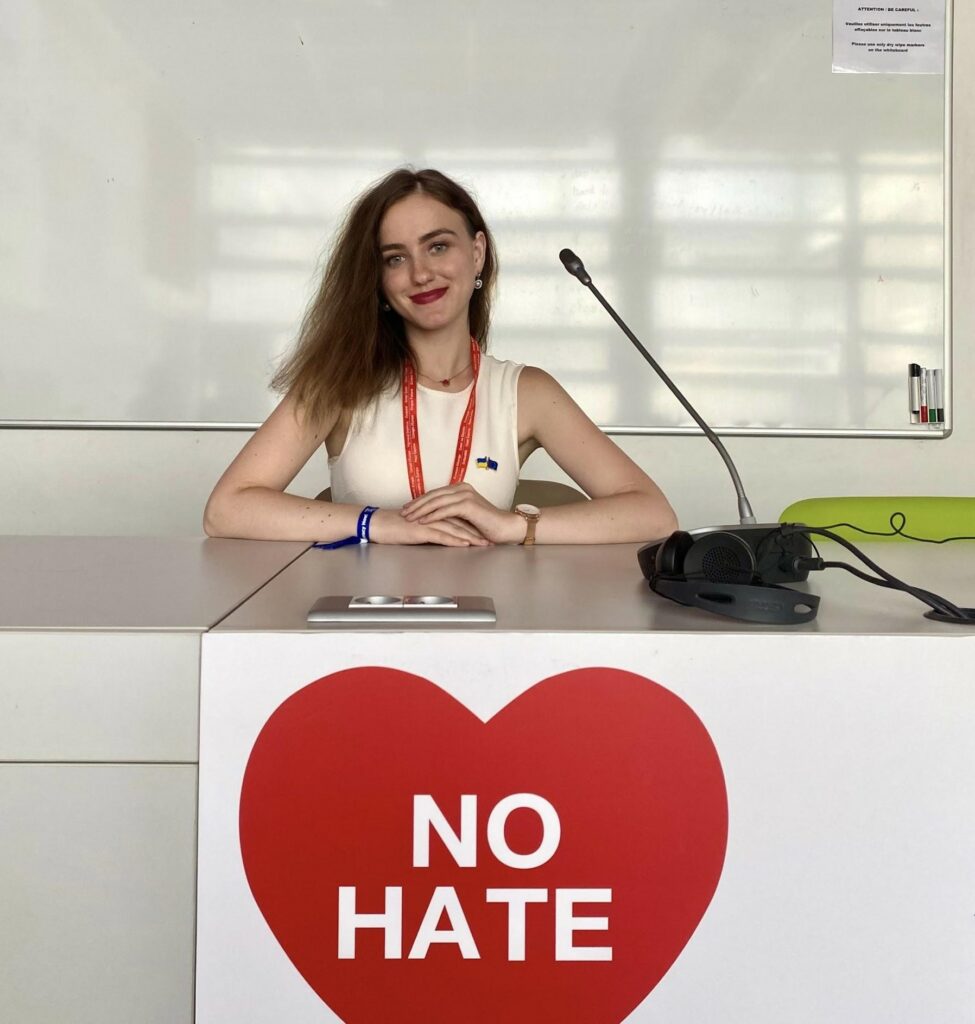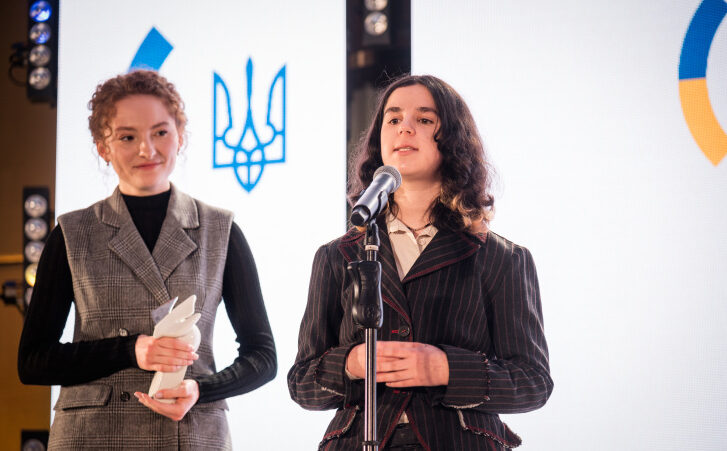
Blog: Youth Action Week – how the war in Ukraine can revitalise democracy in Europe
Wars and armed conflicts, democratic backsliding and democratic fatigue, increased populism and right-wing extremism — all these perils have become the tenor of our time in an ostensibly peaceful and democratic Europe. They illustrate that democracy is in jeopardy and can by no means be taken for granted.
The flagship campaign of the Council of Europe, “Democracy Here / Democracy Now”, organised on the occasion of the 50th anniversary of the Youth Department of the Council of Europe, was designed to address these challenges and discuss their impact on the democratic participation of youth. The event brought together 450 young people from the Member States of the Council of Europe with the aim of discussing key dangers to democracy and drafting a 50-point call for action which would contain recommendations for national governments on how to revitalise democracy and improve meaningful youth participation.
Sixteen Young European Ambassadors from the EU and the Eastern Partnership were among the participants of the Youth Action Week and contributed to the diversity that reigned during the event.
With the event taking place against the backdrop of Russia’s unprovoked invasion of Ukraine, a Member State of the Council of Europe, huge prominence was also paid to youth peace building and how democracy fosters peace and stability in the world. It became evident that democracy is at the core of peaceful coexistence between countries, as core democratic values stand in sharp contrast to wars and aggression. As a matter of fact, true democracies should never wage wars against each other, as this represents a blatant violation of their overriding principles. It is therefore of critical significance to educate young people about democracy and democratic values and how they can contribute to global security and prosperity. Without peace all other global problems just fade into insignificance.
For someone coming from Ukraine, a burgeoning, but promising democracy currently resisting aggression from its neighbour, the campaign strikes a chord in a more profound way. Democracy has never been more at threat than now – at a time when war is raging in a Europe traditionally seen as an oasis of stability and prosperity. Now more than ever, democracy – a core value of the Council of Europe – is compromised and challenged. Democratic backsliding in some Member States of the Council of Europe and Russia’s unprovoked war against Ukraine put a question mark over the efforts of the Council of Europe to promote democracy and human rights as a guarantee that a tragedy akin to World War II would never come to pass again. Yet today we are witnessing this tragedy unfolding before our eyes, which should not prompt doubt about the righteousness of democracy, human rights and the rule of law, but should instead make us redouble our endeavours for these values. Today, Ukraine and other members of the Council of Europe that have not yet undergone the whole process of democratic consolidation need robust support in countering the authoritarian tendencies that are increasingly gaining currency nowadays.
Dwelling on the paradox of history, G. Michael Hopf once said:
“Hard times create strong men, strong men create good times, good times create weak men, and weak men create hard times”.
Today this quote is more relatable than ever. Brave Ukrainians now defending democracy and universal values offer a shining example for us all. Ukraine might not be a model democracy, but it is still a democracy with a very viable civil society and, most importantly, future. The way in which young Ukrainians come up with the most creative ways of contributing to the victory of the democratic cause is truly inspiring. By selling homemade accessories or bakery to help their compatriots rebuild their houses or buy much-needed equipment for hospitals, they show that young people can act as an important social and political actor. Hard times require Ukrainians to act swiftly and decisively. But the experience of Ukraine should serve as a cautionary tale for people who are used to good times and increasingly question democracy as the only way of achieving peace and prosperity. Democracy is not a permanent achievement. Democracy is fickle and must be cherished, protected and promoted.


Today Ukraine is at the forefront in the fight for democracy. The outcome of the war in Ukraine will define the future architecture of the world order and signify either the triumph of democracy or autocracy as two antagonist political regimes. In this vein, the campaign “Democracy Here / Democracy Now” is a good platform to reflect on the values that should define the relations between states in Europe: violence or peace, freedom of speech or censorship, accountability or impunity, cooperation or war, justice or injustice.
As an international organisation, the Council of Europe has been one of the most keen advocates of democracy, human rights and rule of law in Europe and has a long history of supporting countries in their democratisation efforts, ranging from states that were on the opposite sides of history during World War II, to states that only began their democratisation after the collapse of the Soviet Union. With this immense historical responsibility in mind, being at the very heart of the Council of Europe only reinforces the sense of moral duty that we should all have for our nations and Europe as a family of like-minded states. Thus, the main task of youth as the future of this family is to promote democracy in their countries and beyond their borders, stand up for universal human rights and amplify efforts to revitalise and strengthen democracy worldwide.

This was also one of the main messages I strived to put across during our online discussion on political youth participation with other Young European Ambassadors from Georgia and the UK, organised by the EU-Council of Europe Youth Partnership and the Council of Europe’s Youth Department. During the discussion, we exchanged views about the research on political participation of young people produced by the Council of Europe, and dwelt on how young people exercise the right to political participation in their countries. Despite our different backgrounds, political circumstances and experiences, we agreed on a very significant point – young people are more than willing to partake in the political life of their countries, and thus should be given more opportunities to directly impact the political architecture of their states. Involving young people in the decision-making process at national and local level and making their voices more visible — these are the areas in which national governments still have much room for improvement.
In this regard, the war in Ukraine provides a window into how youth can be engaged in contributing to something bigger and meaningful. Being beset by problems, young people in Ukraine do not wait for opportunities to arise. Instead, they strive to create opportunities themselves by launching small initiatives that can grow into something bigger and more impactful. War might be the worst of all evils in the world, but it also gives lessons and examples that can make our future better.
After spending five days at the Youth Action Week in Strasbourg, one begins to realise that “Democracy Here / Democracy Now” is not just a slogan, but a call to action directed not only to participants, but also to national governments. We need more democracy, meaningful youth participation and inclusivity here and now. Today we once again experience hard times that endanger democracy – the very foundation of our peaceful coexistence in Europe. For us, it means that we need to prove that those hard times make us strong citizens who can revitalise democracy and be the driving force behind wholesale change in the world. Let hard times never diminish our strength that derives from our common values and interests, and let them never break our belief in democracy, but only make it stronger.
LATEST

Building Europe: Poland’s experience of joining the European Union and lessons for Ukraine

World Health Day 2024: My Health, My Right

EUREKA MEETS EUROPE – opportunities to develop and study. My experience

Can you wear pink in the workplace?

Go where your deepest fears lie: finding the courage to overcome gender barriers in STEM
More campaign pages:
Interested in the latest news and opportunities?
This website is managed by the EU-funded Regional Communication Programme for the Eastern Neighbourhood ('EU NEIGHBOURS east’), which complements and supports the communication of the Delegations of the European Union in the Eastern partner countries, and works under the guidance of the European Commission’s Directorate-General for Neighbourhood Policy and Enlargement Negotiations, and the European External Action Service. EU NEIGHBOURS east is implemented by a GOPA PACE-led consortium. It is part of the larger Neighbourhood Communication Programme (2020-2024) for the EU's Eastern and Southern Neighbourhood, which also includes 'EU NEIGHBOURS south’ project that runs the EU Neighbours portal.

The information on this site is subject to a Disclaimer and Protection of personal data. © European Union,